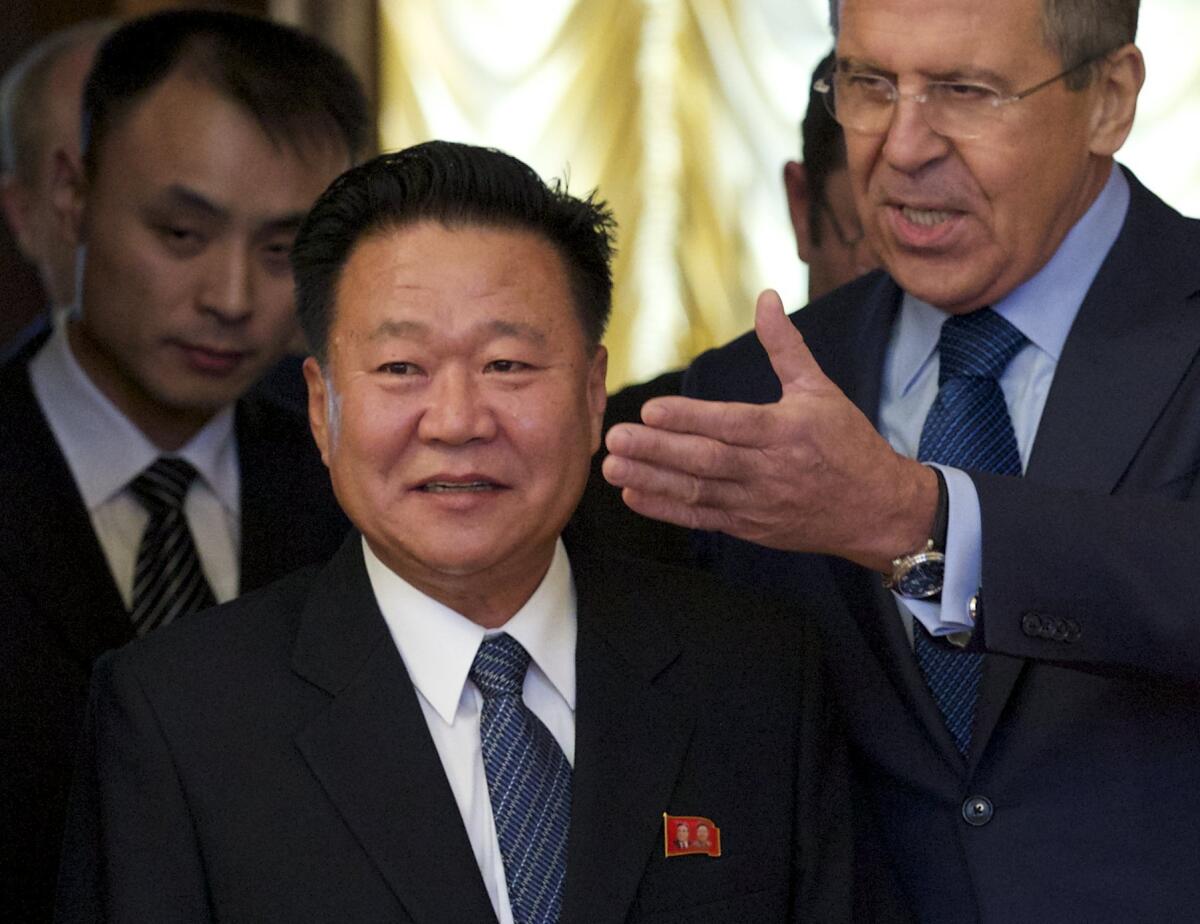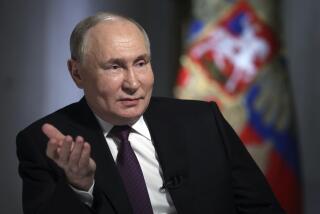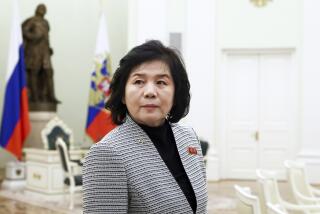North Korea ready to resume six-party nuclear talks, Russia reports

North Korea is ready to resume international talks on its nuclear programs and to work on restoring trade ties with South Korea, the Kremlin announced Thursday after meetings with a high-level official from Pyongyang.
The proclamations appeared to be an attempt by the isolated and sanctioned government of President Vladimir Putin to cast Russia as a critical mediator in global security conflicts and recover Moscow’s role as regional power broker.
Choe Ryong Hae, special envoy of North Korean leader Kim Jong Un, presented Putin with a letter from Kim that offered to restart the six-party nuclear negotiations that have been suspended for five years, Russian Foreign Minister Sergei Lavrov reported.
“An important factor in our joint efforts is strengthening confidence in Northeast Asia and the maintenance of peace and security on the Korean peninsula, and the creation of conditions for the resumption of six-party talks,” Lavrov told the Sputnik news agency after his talks with Choe.
The diplomats discussed several proposed projects to ease tensions between the two Koreas, including work to reunite the north and south rail lines and to build pipelines and delivery routes for Russian gas and electricity across North Korean territory for South Korean consumers.
Kim’s reported offer to restart the nuclear talks was said to be “without conditions,” but in accordance with the forum’s September 2005 declaration of objectives. That included a pledge by Pyongyang to abandon all nuclear programs and abide by the Nuclear Nonproliferation Treaty in exchange for energy and other assistance to North Korea and assurances from the United States that it had no plans to attack or invade.
North Korea conducted nuclear tests in 2006, 2009 and 2013 in violation of the nonproliferation treaty, which it hasn’t signed, as well as the 2005 declaration. The six-party talks -- among North Korea, South Korea, China, Russia, Japan and the United States -- were discontinued in 2009.
On Thursday, analysts of the U.S.-Korea Institute at Johns Hopkins University’s School of Advanced International Studies reported recent activity at North Korea’s Yongbyon Nuclear Scientific Research Center that they said could signal an effort by Pyongyang to extract weapons-grade plutonium from spent fuel rods.
The Yongbyon facility has been shut down for more than 10 weeks, longer than necessary for routine maintenance, the North Korea-watchers reported.
“While it is too soon to reach a definitive conclusion, new evidence is accumulating that suggests: 1) the shutdown may have allowed the North to remove a limited number of fuel rods, possibly failed, from the reactor; and 2) Pyongyang may be preparing to restart the Radiochemical Laboratory, which separates weapons-grade plutonium from waste products in spent nuclear fuel rods,” the analysts said.
Russia’s Tass news agency also reported the U.S.-Korea Institute findings based on recent satellite imagery, without commentary impugning its reliability. That might suggest that Russia, too, wants to strengthen the international community’s influence over its rogue neighbor to deter its development of nuclear weapons.
Russia’s state-controlled media have portrayed Choe’s weeklong visit as a traditional ally’s pursuit of stronger ties with the former communist bloc epicenter.
The Kremlin also has interest in presenting itself as capable of wielding its influence to break international security stalemates in North Korea, Iran and Syria -- all longstanding Moscow allies.
Follow @cjwilliamslat for the latest international news 24/7
More to Read
Start your day right
Sign up for Essential California for news, features and recommendations from the L.A. Times and beyond in your inbox six days a week.
You may occasionally receive promotional content from the Los Angeles Times.







